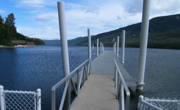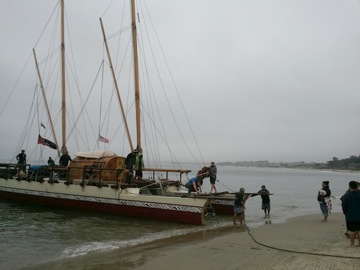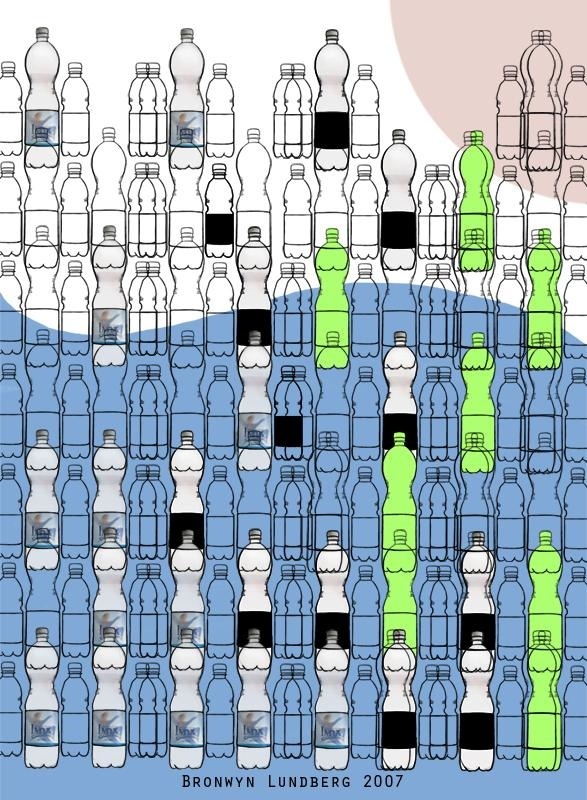 On April 19, 2011, five 60-foot boats left Auckland, New Zealand to set off on a year's voyage. Stops have included a sacred Polynesian homeland known as Hawaii, the end of one of the longer legs of a round-the-Pacific tour. A sixth boat had joined at Cook Islands, and a seventh in Tahiti. The crews represent the biggest traditional transport and exchange of Polynesian islanders in modern times. The nearly identical boats are traditional but modern canoes, a catamaran rig called a waka (or vaka or va'a according to dialect). They are too tall in the water to paddle. I was able to meet up with them in beautiful Monterey Bay, central California. When I asked if these boats were of original design, a crew member told me "hundreds of boats like this came out to meet Captain Cook at one of his early calls." 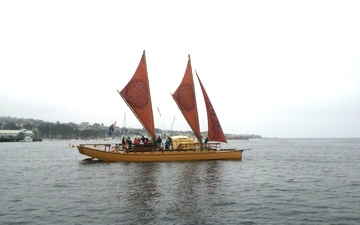 Waka with Monterey's western edge in background
Just as important as the sailing of these traditional craft is perhaps the navigation method employed, handed down for uncounted generations by a revered master to a chosen student. It's not just about reading the stars, but the waves, wind, birds, and more. To complement tradition and bow to 21st century demands, the fleet has high-tech assists, such as auxiliary power in the form of twin submersible electric engines for each boat, powered by solar panels. The motor power, good for 5 knots for 8 hours per charge, is just for maneuvering in and out of harbors. The batteries are not so heavy that sailing speed is compromised, but each engine is always lifted out of the water by pulleys for sailing. The prime supporter making the project possible is the Okeanos Foundation, Germany. It is producing a feature-length documentary film on the voyage called "Blue Canoe" -- referring to our Earth home. From Monterey the fleet is -- at the moment I write this -- on its way to Malibu, working its way down to San Diego where it will winter. Then from Mexico it's on to the Gallapagos, and the South Seas. The last official stop will be an arts festival in the Solomon Islands, the end of the voyage next July. 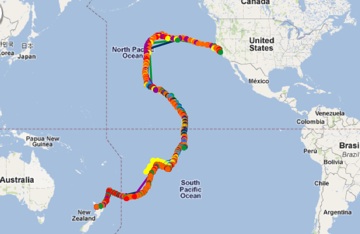 route of the Pacific Voyagers' fleet 2011
Six boats were at anchor on August 13 in Monterey Bay, backed right up to the sand. The seventh waka had remained in Hawaii for training, and returned to Tahiti. Out in Monterey Bay at anchor was the accompanying support ketch serving as home for the film crew. The formal name for the fleet is Fleet Tavaru 2011, "Te Mana o te Moana" - The Spirit of the Sea. I felt that what crossed the world's biggest ocean, laying in front of me, was historic. But to then go out on the waves and speed along in a traditional catamaran canoe under sail was more than exhilarating. The large swells were like gentle souls for our craft, Te Matau a Maui, gracefully moving along as fast as 9 knots. The crew were patient all the while as they let visitors on at the shore for free, to go riding together and help out with rigging and steering. It wasn't a time for the usual activist networking, but I did mention to a couple of voyagers, "this is what the Sail Transport Network is about." It was beautiful to be on the shores of the same Pacific that has been shared with the Polynesians from time immemorial. It was a red letter day for me, and a red letter year for dozens of young Polynesians connecting with their roots:
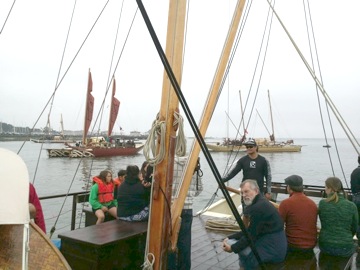 I was glad to hook up the voyagers and organizers with Capt. Charles Moore, author of the upcoming definitive book on the plastic plague, Plastic Ocean. Wakas had collected samples of plastic trash north of Hawaii in the infamous garbage patch discovered by Moore. I was tempted to offer to join crew, so I offered although there's a waiting list. The nice people involved are an inducement. I soon found myself being interviewed on camera for the feature length documentary, and I spoke of peak oil, climate change, sail transport and the plastic plague. This was one of my greatest opportunities to date to potentially expand the Sail Transport Network by including the Pacific Voyagers in the network as well as telling a film audience about STN. Our network unites peoples and their cultures, and its work has barely begun as the globalized world gets back to human-scale proportions and natural values. Many voices create the Pacific Voyagers' blog. Such as, after a closing ceremony before leaving for Maui, two crew members wrote,
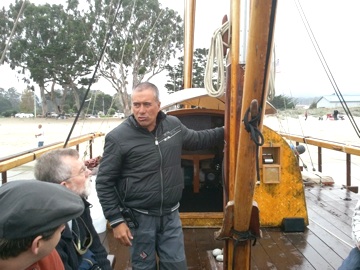 Capt. Frank of Te Matau A Maui. Maui is Hawaiian; Maoris trace descent from there.
Fleet Tavaru 2011 arrived in Hilo, Hawaii, 18th of June 2011, and blogged: "The fleet was greeted with chanting and hula dances by our Hawaiian cousins; each va’a participated in a braiding ceremony connecting tea leaves to a set of stones in the middle. The inspiration of this ceremony reflects the braided leaves as tentacles of the fe’e (octopus) reaching out to everyone, regardless of the distance and the differences each Island is connected. Afterwards, the navigators and captains were invited to take the braided tea leaves up to a hill next to the cliffs; according to oral history this hill was used for navigators of the old to train." "The crew feel invested in a cultural and environmental responsibility. We honor our canoes of a new type, we honor those who participated the revival of traditional navigation in the wake of Hokule'a, Hawaiki Nui o Te au o Tonga, and Hawaii Loa Makali'i, Te aurere. This is the first time that so many people of the great ocean come together to convey a message, that of protecting our common heritage: the Pacific Ocean 'Te Moana Nui Hiva.' To end commercial over fishing, pollution and the killing of protected animals. A shout to the world so that the ocean and its resources, both natural and cultural, are preserved for future generations, the ocean is the cradle of our civilization and the reason to live for millions of islanders."
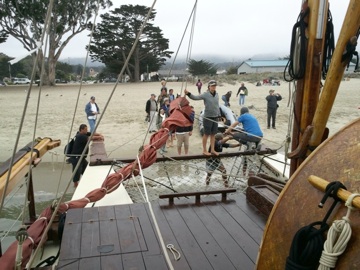 Get on or off shore from canoe, no worries mate. Fog shrouds mountains.
Written from the boat I sailed on, the Te Matau a Maui:
|
|||
 |
||
|
|
